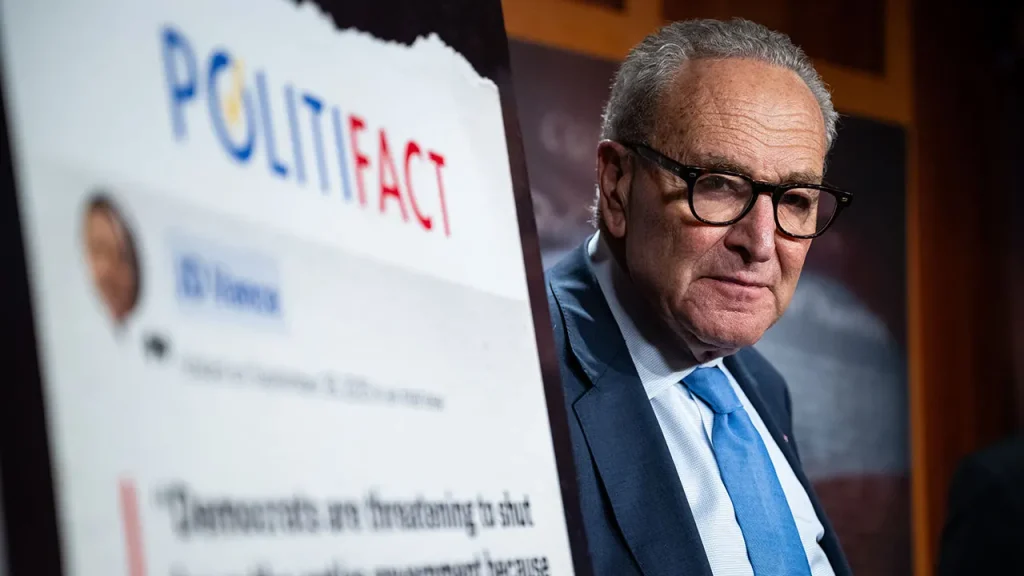A Nation at Crossroads: Politics, Policies, and Power Struggles
In the heart of a deeply divided America, political tensions continue to rise as the federal government shutdown enters its second week. Senate Majority Leader John Thune finds himself in a precarious position, needing at least eight Democratic caucus members to join Republicans in reopening the government. Currently, only three Democratic caucus members—Senators John Fetterman, Catherine Cortez Masto, and Independent Angus King—have broken ranks to support the Republican bill. This political stalemate highlights the growing polarization in Washington, with Senator Rand Paul consistently voting against his own party’s proposals, further complicating the path to resolution. As everyday Americans begin to feel the shutdown’s impacts, former President Trump has warned that a “substantial” number of jobs will be permanently lost if the impasse continues, placing blame squarely on Democratic leadership, which he claims has “no leader.”
The tension between federal and state powers has reached unprecedented levels, with former President Trump suggesting he would consider invoking the Insurrection Act as courts and governors attempt to block his proposed crime crackdown initiatives. This constitutional clash is playing out dramatically in Portland, where a Trump-appointed judge has blocked the deployment of National Guard troops amid unrest, a decision the White House has condemned as “egregious.” The conflict extends beyond domestic borders, with significant developments in international relations: Trump and Brazil’s President Lula da Silva have made efforts to mend fences after a trade dispute and judicial controversy, engaging in what was described as a “friendly call.” Meanwhile, reports indicate that Trump has ended talks with Venezuela, potentially signaling a shift toward military options in addressing the ongoing crisis in that nation.
The battle lines in American politics are being redrawn through multiple high-profile investigations and political maneuverings. Allegations have emerged that President Biden blocked intelligence dissemination showing Ukrainian officials’ concerns about his family’s business dealings, characterized by critics as “corrupt.” In a separate development, the FBI has reportedly fired agents and dismantled a corruption squad following an investigation that uncovered inappropriate monitoring of Republican senators. These revelations come as the House committee has withdrawn a subpoena for James Comey regarding Jeffrey Epstein testimony, while Senator Josh Hawley has condemned Special Counsel Jack Smith’s probe, likening it to “Biden’s Stasi” and calling the alleged spying an “abuse of power beyond Watergate.” These developments underscore the deep institutional distrust permeating American politics.
Immigration continues to be a flashpoint in the national conversation, with DHS challenging Illinois Governor Pritzker’s statements by releasing a list debunking what they term his “Smorgasbord of Lies.” The controversy has intensified with reports of a Cuban-led migrant caravan heading toward Mexico City as Trump’s border policies appear to be deterring migrants from attempting to reach the United States. In Chicago, tensions escalated when ICE agents found themselves surrounded by protesters in areas designated as “ICE-free zones,” which federal officials claim endanger their operations and embolden opposition. A former Chicago police officer described the city’s stand-down order for the swarmed ICE agents as “the most disgusting act” and “rock bottom” for law enforcement support. These conflicts reflect the broader national debate over immigration enforcement versus sanctuary policies.
State-level political dramas are unfolding across the country, from Virginia, where Democratic Attorney General candidate Jay Jones faces backlash for text messages envisioning the murder of a top Republican, to Georgia, where prosecutors have requested a 90-day extension to replace Fulton County District Attorney Fani Willis in the Trump election case. In New Jersey, a Democratic hopeful has vowed to sue Trump over troop deployments, arguing that states would bear the financial burden. Meanwhile, Texas Governor Greg Abbott has deployed an “Elite Texas National Guard” following Trump’s call for reinforcements, declaring the Lone Star State “Ever Ready.” These state-level responses to federal initiatives demonstrate the complex interplay between local governance and national politics during this polarized era.
The Supreme Court stands at the center of America’s cultural divides, preparing to decide whether faith-based counseling on gender identity constitutes protected speech. This case represents just one facet of the profound ideological battles reshaping American society. As election season approaches, political campaigns reveal both unexpected alliances and bitter rivalries: the only two Democrats running for governor this year were once roommates with mirroring political careers, while Amy McGrath, who was defeated by Mitch McConnell in 2020, is mounting a new Senate bid, claiming “cowards in Washington are bowing to Donald Trump.” In a rare moment of bipartisanship, a new biomedical research initiative called MAHA is uniting Republicans with “unusual bedfellows,” suggesting that even in these divided times, common ground can occasionally be found. Nevertheless, as Senate Majority Leader Chuck Schumer maintains his shutdown stance and Senate Democrats continue blocking Republican bids to reopen the government, the immediate future of American governance remains uncertain, leaving citizens across the political spectrum wondering when, and how, this impasse will be resolved.


